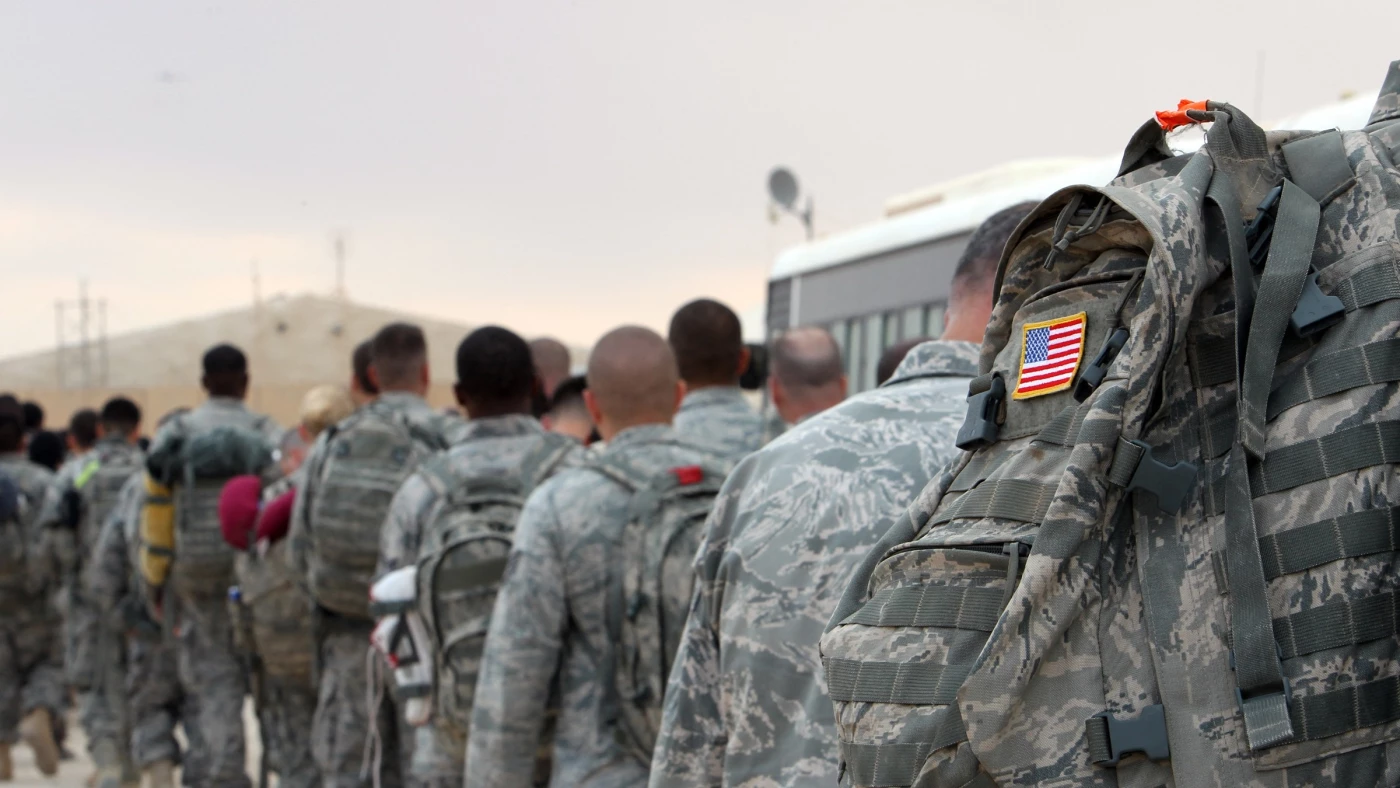Iraq has reached an agreement with the US administration to end the mission of the US-led global coalition and announce a schedule for the withdrawal of US forces from Iraq, but the announcement, initially scheduled for last week, has been postponed until further notice, Iraqi officials and politicians told The New Region.
The US has approximately 2400 military personnel-deployed in Iraq and an additional 800 deployed in Syria, US Central Command, said. US forces were deployed to Iraq at the request of the Iraqi government in 2014 to fight the Islamic State militants, which had then overrun large swathes of Iraqi territory in the north and west of the country.
Ending the presence of US troops and the US-led global military coalition in Iraq is one of the key conditions that the current Iraqi Prime Minister, Mohammed Shia’ al-Sudani, committed to before his Shiite backers before assuming office in October 2022.
Iraq and the administration of US President Joe Biden began bilateral talks in January to end the mission of the US-led International Military Coalition in Iraq and “enable the transition to an enduring bilateral security partnership” with the US.
The obstacle that the negotiators of both parties have been facing over the past months has been the time period required to withdraw coalition forces from the country, Iraqi officials and diplomats said.
However, the latest round of talks, which took place in Washington late July, witnessed a breakthrough and initial agreement on a Memorandum of Understanding (MoU) that “satisfies” both parties, Iraqi officials told The New Region.
The agreement that Sudani presented to the leaders of the Coordination Framework, the largest Shiite coalition that includes the Iran-backed political forces and most of Shiite armed factions, on Monday, stipulates that the US side announced a schedule for the withdrawal of its forces from Iraqi territory within a period not exceeding 24 months.
The New Region understands that the deal suggests the withdrawal will be in two stages. The first, starts in September 2024 and includes the withdrawal from Ain al-Asad airbase in western Iraq and Victoria air base west of Baghdad as well as the rest of the sites in Baghdad and Anbar within a period not exceeding one year.
The second stage includes the withdrawal from Harir airbase in Erbil and the rest of the sites in northern Iraq starting from September 2025.
“The proposed time frame for withdrawal is long but we do not have many options. The leaders of the Coordination Framework gave Sudani the green light to go ahead with this agreement,” one of the leaders of the Coordination Framework who attended the meeting told The New Region.
Four of Sudani’s advisors, who spoke to The New Region on condition of anonymity due to the sensitivity of the matter, confirmed that the Iraqi negotiating team had reached said agreement.
“The agreement between Baghdad and Washington was actually concluded late last month and we are waiting for it to be announced,” one of Sudani’s advisors said. “The point of contention between the two parties was over the proposed time frame for the withdrawal, but Iraq finally agreed that Americans would remain in Kurdistan for another year after they withdrew from other areas.”
“There are many issues that need to be sorted out before they withdraw completely, including the war against ISIS and the unstable security situation in eastern Syria, so we agreed that some of their forces would remain in Kurdistan for another year,” the advisor added.
The US Embassy in Baghdad declined to comment.
The embassy’s spokesperson’s office told The New Region that “the embassy does not comment on ongoing negotiations.”
However, a US internal document provided by the US Congressional Research Service (CRS) to members of Congress on Tuesday, noted that Iraqi security officials visited Washington DC in July 2024 for joint security cooperation dialogue talks, and the two sides “decided to begin work on a memorandum of understanding (MOU) to provide an enhanced framework for their bilateral security relationship”.
Postponed until further notice
Announcing the latest progress-achieved by the Iraqi and US sides was scheduled to take place early this week during a planned visit for General Michael Erik Kurilla, commander of the US Central Command, to Baghdad, a member of the Iraqi negotiating team told The New Region, but the announcement was “canceled” despite Kurilla’s presence in the Middle East.
Iraqi officials said that they have not been given an explanation for the postponement of the announcement, which was planned for the past few days, but they believe that the security escalation in the Middle East following the assassination of Ismail Haniyeh, the head of the political bureau of the Palestinian Hamas movement, in Tehran late last month and the attack on Ain al-Asad airbase on Monday, which wounded five US service members, may be the reason.
“Nobody told us anything. The announcement was postponed without any explanation,” a member of the Iraqi negotiating team, told The New Region. “There is a strange secrecy and ambiguity surrounding the actions of the American side regarding this issue.”
"The reason for the postponement may be due to the tension in the region, or it may be due to the recent attack that targeted Ain al-Assad base. We do not know,” the source added.
US officials and Tuesday's CRS briefing suggest that the attack - targeted Ain al-Assad on Monday “could affect the U.S.-Iraqi talks on the future of U.S. forces in Iraq”.
However, a senior Iraqi official familiar with the talks, who like others spoke on condition of anonymity, told The New Region that the Iraqi government had reached a “full understanding” on a timetable for the withdrawal of U.S. forces and the end of the coalition’s mission in Iraq, but that the attack on Ain al-Asad “delayed the announcement of this agreement,” because it clearly demonstrated “the Iraqi government’s inability to guarantee the position of some armed factions toward US forces and interests in Iraq.”
Sudani’s partners may be a stumbling block
Ending the presence of US forces in Iraq is a controversial issue that Iraqi partners usually do not agree on.
The Kurds and Sunnis see the continued presence of these forces as their “guarantee” to curb their Shiite partners who they claim seek to “monopolize” the country’s resources.
The Kurds and Sunnis see any agreement with the US side that is made without their participation as “an agreement that is not binding on them,” Kurdish and Sunni politicians told The New Region.
“No agreement has been made on the matter of withdrawal with Kurdish authorities,” a senior Kurdish Ministry of Peshmerga official told The New Region.
“If Iraq has made a unilateral agreement with the US, that is different, however no Kurdish Peshmerga representative and no Kurdistan Regional Government representative has been involved in any such agreement,” the source added.
Keeping some of US troops in Harir airbase for at least two years, according to the concluded MoU, may ensure that the Kurdish forces will not oppose it, while the weakness of the Sunni political forces, their dispersion and their alliances with the Shiite political forces will ensure that no real opposition will emerge.
However, while most of Sudani’s Shiite partners gave the green light to proceed with concluding this agreement, the biggest challenge facing Sudani and threatening any agreement he might conclude with the US administration is the position of Kataib Hezbollah, which refuses to engage in any agreement or truce with US forces at this stage.
"Kataib Hezbollah feel that they have grievances with the Americans and that Sudani and the leaders of the Coordination Framework have let them down and abandoned them," a prominent commander of an Iran-backed paramilitary group told the New Region.
"Their (Kataib Hezbollah) relationship with the government is very tense, as is the case with most of the leaders of the other armed factions,” the commander said. "Sudani must find a way to convince them and ensure that they stop their attacks against the Americans, otherwise the situation will be different.”



 Facebook
Facebook
 LinkedIn
LinkedIn
 Telegram
Telegram
 X
X


